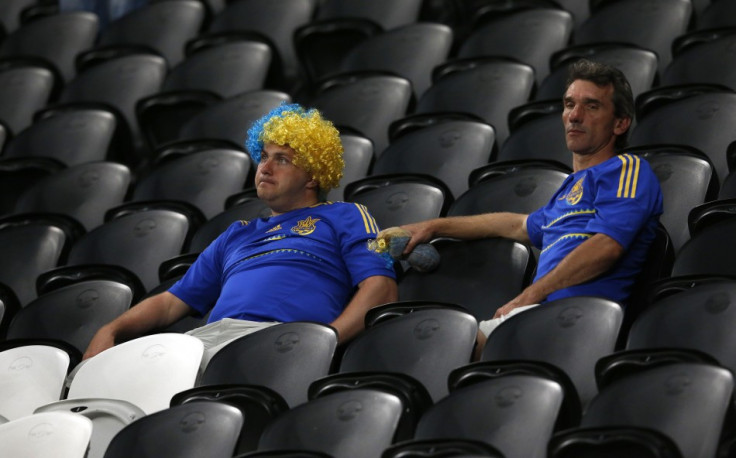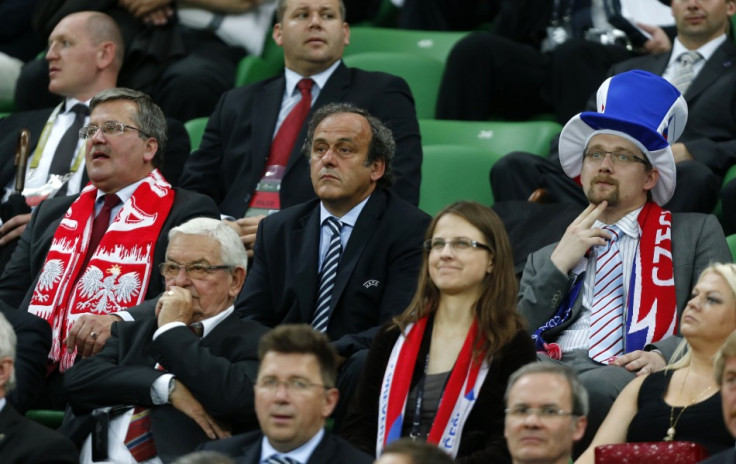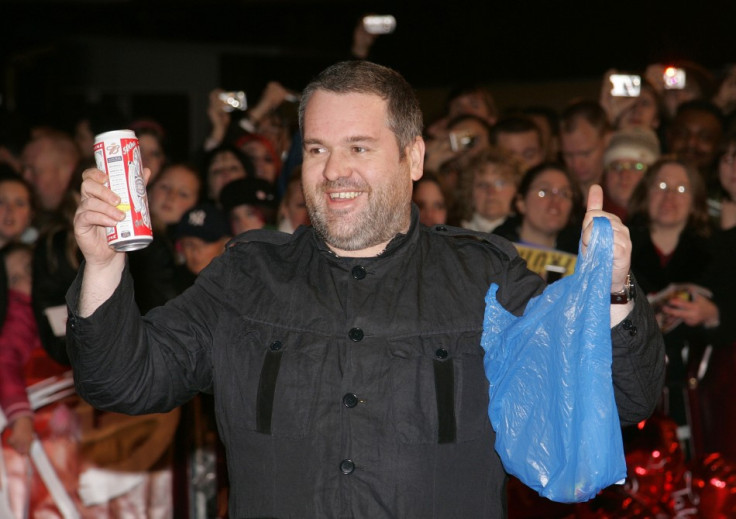Euro 2012: Mexican Waves, Platini And Radio 1 Undermine Exciting Group Stage
COMMENT: With the European Championship group phase done and dusted, what have we learned from the last 12 days of football?
Poland and Ukraine provide a diluted football experience
If the vuvuzela was the overriding memory of the colour, and definitely the noise, of supporters during the South Africa World Cup two years ago, then the undeniable recollection surrounding this summer's European Championship has been the manufactured gaudery accompanying every game.
Instead of allowing the referee to start the match when he sees fit, like any regular official, the stadium announcer proceeds to countdown to kick-off, alerting the referee and anyone else who might have forgotten, that behind the inept atmosphere, there is a football match going on.
Many have revelled in the tournament's excitement and constant ability to thrill this summer, but in toe with every goal, comes a fad that is beginning to undermine the celebration and joy that comes with the scoring of a goal. The organisers have pledged to play the White Stripes' 'Seven Nation Army' after every goal during the tournament in an attempt to stir some atmosphere. While the tune has occasionally accompanied the celebration from a team's support, it instead works to mask the fact that there aren't enough fans from one particular country to make a notable noise.
There's a fine line between trying to get seats filled, and filling them with people who have come for a party rather than a football match. With every Mexican wave that passes by, even in games which have captured the attention, you're met with the feeling the organisers have tried to fill stadiums to save face rather than add something to the football experience. Whichever one you chose, it hasn't turned out well.
Artificial atmosphere coupled with unfilled stadiums is the first scrap of proof UEFA have chosen countries, who away from their right to hold the tournament amid their issues with racism, where supporters simply aren't willing to travel. The unbalanced support we have seen from some countries, most notably England, has done nothing to add to the sense of occasion or feeling that is a multi-country tournament; a vital entity of any successful major finals.

Time for fingers to be pointed throughout Europe
The BBC's panorama program gave a frank and explicit insight into the problems with racism in both Polish and Ukrainian domestic football. Former England international Sol Campbell said the spates of racially influenced violence could lead to fans "coming back in a coffin."
After the scrutiny surrounding racism in the host nations swelled, the incidents reported to UEFA or otherwise, have involved several participating countries. Furthermore, issues with fan behaviour, which has also included England, has led to a number of charges from UEFA. Russian, Ukrainian, English, Croatian, Portuguese and Polish football associations have all been charged by UEFA this summer, defying any sort of myth that problems were deep with the supporters of just the host countries.
The organisers have hardly come out of the spate of charges smelling of roses either. From a safety point of view, it has become alarming the regularity of which flares and illegal banners have entered stadia across both countries. While journalists have been subjected to airport-style frisking and bag checking, supporters have been disrupting matches, with charges dominating events post-match.
Platini's ignorance could destroy reputation
This summer's feast of football has been tarnished with the knowledge that it could be the last we see of the European Championship in its entertaining guise. UEFA president Michel Platini, wants to expand the competition to 24 teams for the tournament in France in 2016. The format is yet to be confirmed, but the extra eight teams are likely to weaken the unrelenting quality on show and make the group stage a procession; mirroring the Champions League.
While, as ever, a tournament is won in the knock-out phase, the group stage at Euro 2012 has been among the most exciting part of any major finals in recent years. While Platini will argue it opens the tournament up to countries who have never participated before, it will actually assure that the tournament's prized assets don't miss out. Instead of strengthening the position of Europe's minor countries, it has instead assisted the position of the continent's bigger sides. Furthermore, after those weaker nations are predictably swatted away during a tedious group stage - in similar fashion to a World Cup tournament - we'll be left with the same knockout phase we endured four years previous.
With television companies delighted that Europe's best players will remain, Platini can sit safe in the knowledge that UEFA's sponsorship friends are content. Forgive me, but I thought being associated with a non-credible brand would be more damaging than the loss of exposure? My mistake.
Keeping sponsors happy is something Platini's mob have good practise of, and in supporting UEFA's core sponsorship group in fining Nicklas Bendtner £80,000 for displaying Paddy Power branded underwear; a conflicting sponsor in the eyes of the governing body, Platini has simultaneously undermined the crusade against racism. A paltry £65,000 fine was given to the Croatian football association after their fans racially abuse Mario Balotelli.
While few will argue with the punishment given to the Danish striker, in comparison to the fine given to Croatia, it appears obvious that UEFA have got their priorities completely wrong. Platini's loyalty to the sponsors could perhaps be dictated by the failure to sell-out many of the venues for matches at Euro 2012. With the revenue from limited tickets sales necessary to fill the pockets of UEFA executives no wonder Platini is cosying up to the men with the money.

Netherlands and Russia feel complacency pain
It says plenty about this tournament's off the field problems that even amid one of the most exciting major finals in recent history, the helter-skelter matches have played second fiddle. As Greece showed in 2004, the shorter version of the tournament lends itself to a surprise winner, and a shock exit along the way. A smaller, closer matched roster of teams also means there is rarely a runaway winner in each group, keeping the qualification spots alive for the final matches.
In group A, after thrilling onlookers with their pass and move football, Russia required just a point in their final game against Greece, who themselves needed a win to qualify, to reach the last eight. The 2004 champions had looked weak at the back against Poland and the Czech Republic, but they stemmed the flow against the Russians, with Giorgos Karagounis scoring the decisive goal in the twilight of the first half. Given the dominance of Dick Advocaat's side during their opening two matches, their exit worked as the first major shock of the tournament.
The second came in the form of Netherlands, who despite being drawn in this year's edition of the group of death, were expected to progress having reached the World Cup final in 2010. They leave with the second worst record in the tournament, having lost all three of their games, scoring just twice. Following the campaign in South Africa, Bert van Marwijk was perhaps guilty of asking his side to play a more offensive style, to attempt to distance themselves from the rugged and uncompromising side that bullied their way to the final.
As a result, relying on their back-four which included the hapless trio of Jetro Willems, Johnny Heitinga and Joris Mathijsen, contributed to their downfall, while the form particularly of Arjen Robben, who was nullified from the outset, assisted in producing not so much total football from the Dutch, but total rubbish.
From the 11 core players that Van Marwijk used through the tournament, nine of those featured in the World Cup final two years previous. Of the two absentees; Giovanni Van Bronckhorst retired following the final, while Dirk Kuyt featured from the bench in two of the three group games. Adopting a different approach, and yet not moving the team on appears to have significantly impacted on their ability to compete with their fresh and vibrant opponents. A strategy that got them through qualifying has failed miserably come the crunch.

The BBC crash
Not something that all viewers of the European Championship have had to endure, but for those millions who have had to watch the games from the comfort of their sofas in the United Kingdom, the company of the BBC has been most unpleasant.
The Beeb rarely slip up when it comes to the big occasion it must be said; as we'll find out later this year with their coverage of the Olympic Games, but if ITV are Italy; trying something a bit different in order to freshen their approach and defy the critics, then the BBC have been Netherlands; more willing to go down the brutally clinical tried and tested route so not to upset the status quo.
With Roy Keane, Jamie Carragher, and Gareth Southgate out in force for ITV, their Warsaw studio's massive chairs are accompanied by worthwhile opinions and snappy analysis.
With the BBC, it's as you were. Gary Lineker lends some much needed direction to a panel including Alan Hansen, who is still checking every word he utters to prevent criticising anyone connected with Liverpool and Alan Shearer, whose opinions scale both ends of the proverbial fence. In fact the former Newcastle United striker is not so much the fence, as he is the concrete pillar holding it together. Without his modest analysis and tendency to commentate on the action rather than actually pass comment on it, who knows how the BBC's straight bat policy would cope?
The cherry on the icing of the BBC's neutral jam sponge cake comes via their red button coverage, which while it provides the viewer with the option to listen to the superb commentary from Radio 5 Live, it also supplies alternative commentary from *comedy* duo Chris Moyles and David Lloyd Vitty, or Comedy Dave.
The jovial pair were employed during the World Cup to ridicule the likes of New Zealand and Slovenia to the entertainment of those who find hilarity in the assignation of prematurely born puppies. They have returned for the European Championship with extra jingles to tickle the moronic few who dare turn over. In an attempt to assure someone listens to them during a week-day, they've joined together in attempt to ruin football altogether; perhaps they know Michel Platini?
© Copyright IBTimes 2025. All rights reserved.






















